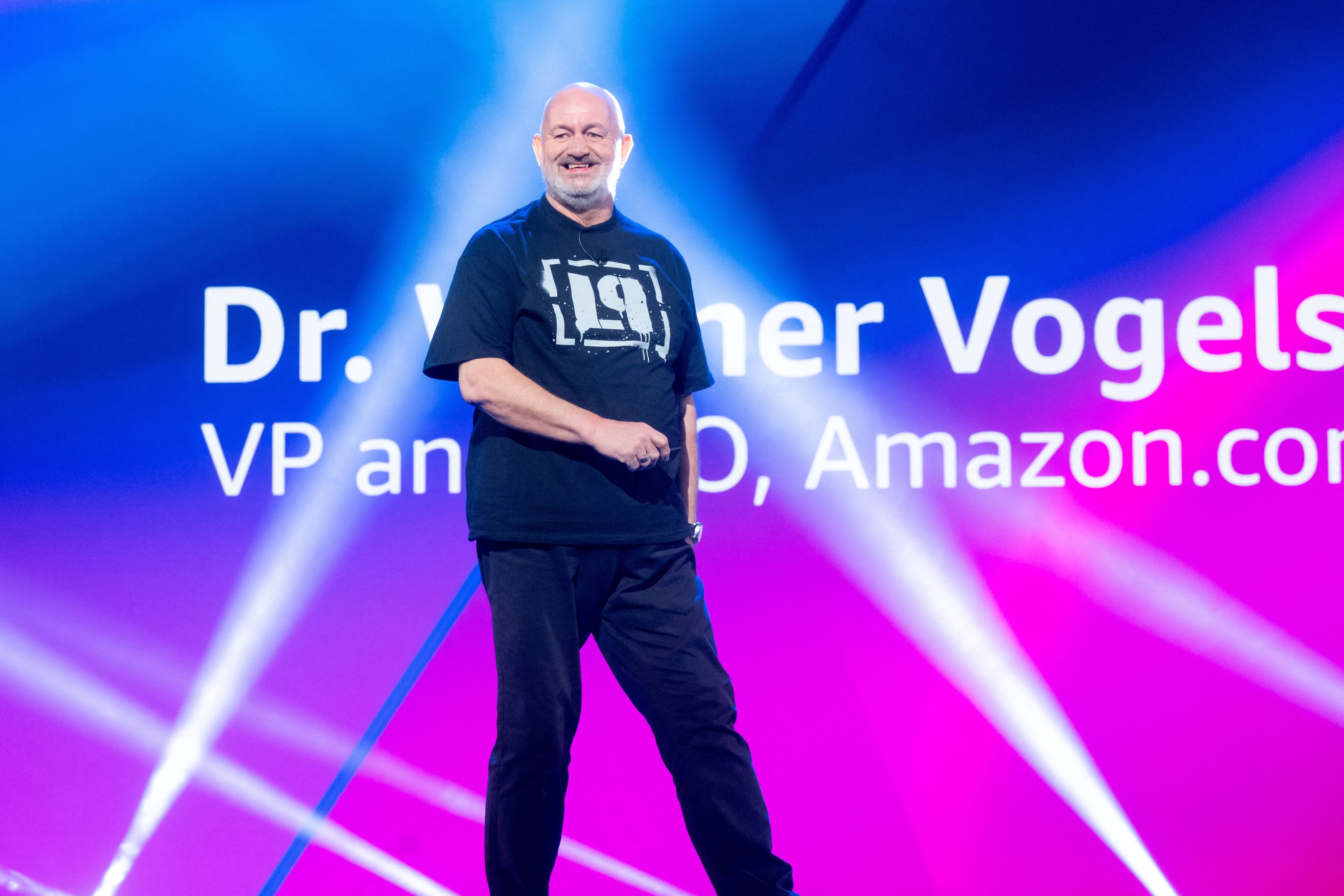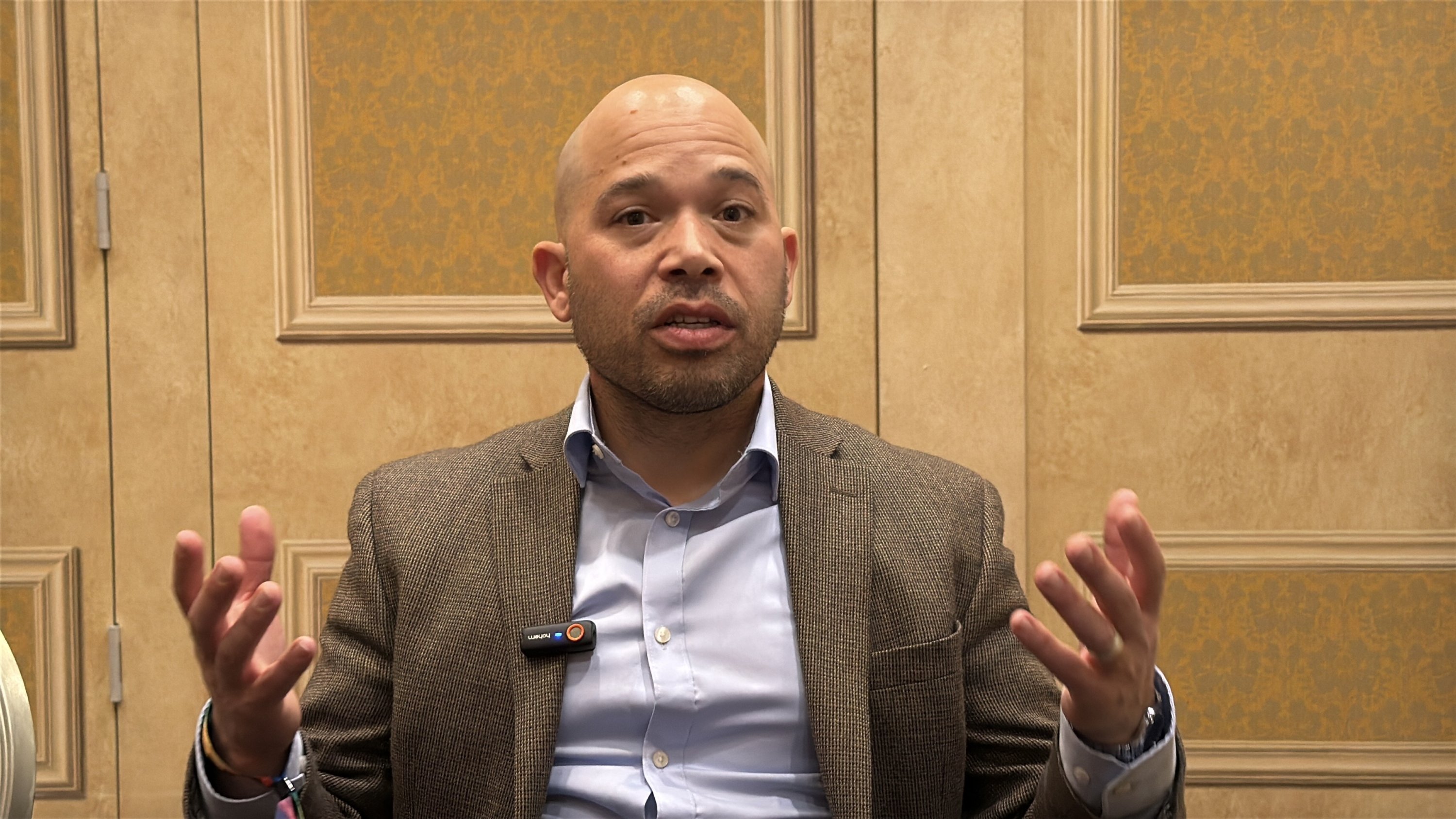© Turkuvaz Haberleşme ve Yayıncılık 2026
Harnessing the power of technology for the good of humanity has become both an ethical imperative and a profitable endeavor. From clean energy innovations opening new pathways for sustainable development to artificial intelligence-powered tools combating disinformation, technology is enhancing human creativity across a broad spectrum.
Amazon's chief technology officer, Werner Vogels, recently shared his predictions for what lies ahead in 2025 and beyond, saying, among others, that companies that offer meaningful work to their employees and encourage positive change will attract the best talent.
"The rising energy demand and climate-related imperatives are driving a transformation in how we produce, store and consume energy. The proliferation of nuclear energy and the continued growth of renewables will pave the way for a future where our energy infrastructure serves as a catalyst rather than a barrier to innovation," said Vogels.
As disinformation spreads at unprecedented rates, he says, "a new wave of AI-powered tools will emerge to empower journalists, researchers and engaged citizens in their quest for truth."
Vogels is optimistic about the technological revolution's potential to democratize investigative capabilities, saying a shift toward accuracy can be expected in the coming years.
"These tools will accelerate fact-checking and begin to close the gap between the spread of misinformation and its debunking. Their development and democratization will level the playing field, ensuring that accurate information flows as quickly as disinformation. This transition will help restore trust in traditional news sources and improve the overall quality of conversations on digital platforms," he noted.
"The wide-reaching impact will benefit consumers, businesses protecting their reputations, governments keeping their publics informed and organizations at large."
Effective disaster preparedness hinges on the ability to collect and use data within a structured framework. While centralized aid efforts have the advantage of mobilizing large-scale resources, they often lack the agility and dynamism needed for rapid response.

Vogels sees a shift toward community-centered platforms that empower individuals to take responsibility for their own safety.
"By putting data and decision-making power in the hands of communities, we are not only improving disaster response but also creating a network of disaster management hubs that ensure better preparedness. In the face of increasing disasters, transitioning from reactive to proactive, data-driven disaster preparedness is not just a good thing, it is an absolute necessity," he said.
"Ultimately, by adopting a community-centered, data-driven model, we are building a future where technology enhances human resilience and enables communities to navigate an increasingly unpredictable world with confidence."
As more people seek refuge from constant distractions, devices prioritizing mindfulness, intentionality and deep thinking are emerging.
Vogels continues, "We're witnessing the rise of minimalist phones that only offer calling and texting functions, cameras that emphasize taking photos over sharing them and music players that let us enjoy music without a barrage of messages and notifications. In 2025 and beyond, we will use technology to enhance our focus rather than distract us, which will benefit us all."
Vogels highlighted two types of complexity: "Desired complexity, which is the complexity that software architects willingly accept to add new capabilities, and 'unwanted complexity,' which often sneaks in due to evolving technologies or a lack of architectural oversight, slowing growth and making systems harder to manage. Complexity cannot be created or destroyed, only moved elsewhere."
There are several ways companies can embrace simplicity within complexity, he noted. "While complexity may be inevitable, steps can be taken to keep operations as straightforward as possible."
Google has announced significant advancements in artificial intelligence and quantum computing with the introduction of Gemini 2.0 and Deep Research updates, and a groundbreaking quantum chip named Willow.
CEO Sundar Pichai highlighted that these advancements are in line with the company's mission to organize information and make it universally accessible and useful.
Gemini 2.0 stands out with its multimodal capabilities and enhanced performance, while Deep Research emerges as a new tool allowing users to explore complex topics efficiently.

Google Quantum AI also introduced Willow, a quantum computing chip that is set to revolutionize the field with its advanced capabilities in error correction and processing speed.
Deep Research, available to Gemini Advanced users, enables the rapid and effective examination of complex subjects.
The feature creates multi-step research plans guided by users, gathers information from the web and presents it in comprehensive reports complete with source links and detailed analyses. This offers significant benefits to marketers, entrepreneurs and researchers.
Google DeepMind is committed to the safety and responsibility of AI models. The development of privacy controls and user-centric security measures in prototypes like Project Astra underscores this commitment. The multimodal structure of Gemini 2.0 supports more complex security evaluations.
In Türkiye, TRUBA, the country's fastest supercomputer, is currently used for intensive scientific calculations, such as running a complex weather prediction model in about 10 hours.
It is anticipated that Willow could complete a similar model in mere seconds, demonstrating a significant leap in computational speed compared to traditional supercomputers. Willow's success opens doors for innovations ranging from accelerating scientific discoveries to combating climate change.
The development of quantum technologies globally holds great promise for data processing speeds and reducing error rates. By making this technology more accessible and effective, Willow offers significant opportunities for researchers and industries.
Willow can exponentially reduce errors as the number of qubits (quantum bits) increases. This innovation solves a quantum error correction problem that has been awaited for 30 years.
It completed a benchmark complex computation in less than 5 minutes. The same computation would take theworld'ss fastest supercomputer 10 septillion years, far exceeding the known age of the universe.
Despite adequate capital availability for seed and Series A rounds, there is a notable funding shortfall for later-stage financing in Europe, according to Atomico's European Technology Report. This gap is causing a tightening of financial resources in the European startup ecosystem, with investors becoming more selective in their investment decisions.
David Roldan, head of Startup Business Development for the Europe, the Middle East and Africa (EMEA) region at Amazon Web Services (AWS), observed that overall, there has been a slight increase in startup financing in Europe, although it has remained largely stable.
"We've seen a significant drop in the number of deals, roughly 30%. However, the size of the checks being written has increased. This indicates that investors are gravitating towards quality. To overcome this, some multinational funds, particularly those from Silicon Valley, are establishing offices in Europe. Firms like Iconic and Sequoia are taking steps to boost late-stage investments in the region," he said.
When it comes to growing a startup with AWS, Roldan says they believe in the importance of close collaboration, noting that this partnership extends beyond technical teams.

"For example, through our Activate program, our solution architects work with startups' engineering teams to help them design solutions that are both cost-efficient and high-performing. Additionally, we support startups' growth by assisting with market entry. We have various programs to teach strategies for co-selling with AWS, listing on AWS Marketplace, and selling from this platform. Our go-to-market sprint program, in particular, helps them complete these processes within weeks," he explained.
Roldan also commented on the fragmented nature of the European market, where strong sectors vary by country.
"In Türkiye, the gaming sector is quite strong. In the United Kingdom, sectors like fintech, health sciences, enterprise software and B2B SaaS are prominent. In Germany, we see a focus on health sciences and biopharma, along with the B2C sector," he noted.
"Additionally, we have a climate grant program. Through this program, we provide startups with access to AWS's climate teams and guide them in following the correct sustainability standards."
One of Türkiye's leading telecommunications and technology companies, Türk Telekom, is inviting young individuals aspiring for careers in data science and data engineering to join the "Big Data Camp," which will mark its debut this year.
By supporting young talents in the early stages of their career journeys, Türk Telekom aims to play a pivotal role in Türkiye's digital transformation.
The Big Data Camp offers participants experience-focused learning, insights into innovative business areas and opportunities to connect with industry professionals. Under the umbrella of Türk Telekom's Development Base, the camp seeks to reach out to talents in the big data domain, impart technological knowledge and address the demand for skilled professionals, thereby creating new employment opportunities.
Applications for the groundbreaking program, which will run from Jan. 27 to Feb. 7, 2025, will remain open until Dec. 18, 2024.
The camp will provide both online and in-person training, aiming to offer early career opportunities in data science and engineering.
Hüseyin Aslan, deputy general manager in charge of human resources at Türk Telekom, emphasized the company's commitment to continuous learning and development.
"We position Türk Telekom as a living university. Through our education and career programs, we offer young people the chance to actively participate in building the digital future, continuing to invest in people, our most valuable resource. By bringing our expert employees together with young individuals, we transfer our technological knowledge and contribute to the formation of a qualified workforce with a human-centric approach," said Aslan.
"We are launching the Big Data Camp this year, focusing on data science and engineering. Investing in data, one of the biggest resources of the digital world, and training future data experts is a significant step towards valuing people and fostering human-centric development."
Participants will engage in a 10-day program filled with rich content designed to encourage creativity, learning and out-of-the-box thinking. The training will include both technical and practical courses, as well as special sessions to support personal and professional development.
